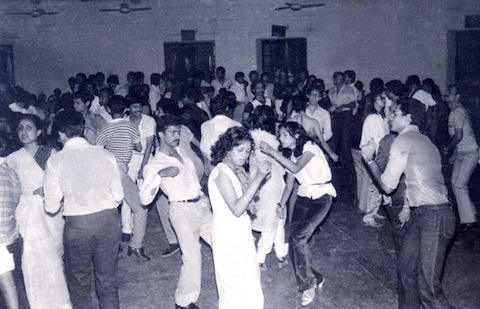Lost the morning to a parent-teacher conference at Microkhan Jr.’s school. Now on to shaping my next Wired feature. Back to this space as soon as humanly possible.
Progress Report
November 14th, 2011
Comments Off on Progress ReportTags:Earth Wind & Fire·Japan·music·R&B
Local Knowledge
November 11th, 2011
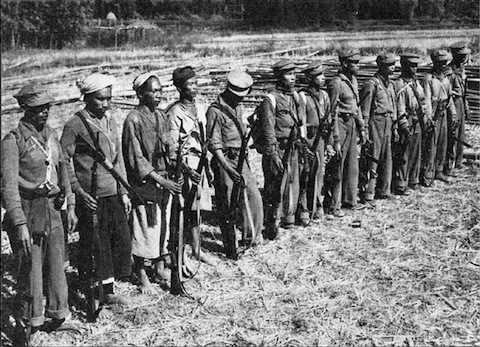 A brief Veterans Day special today, as I try and dedicate a strong eight hours to the book. I was planning on directing your attention to this excellent site, which honors the men and women of the 335th Station Hospital in Tagap Ga—the Burmese hamlet where so much Now the Hell Will Start action goes down. But I just couldn’t resist the temptation to give some love to the Kachin Rangers, the unit of Burmese jungle fighters our men in OSS Detachment 101 pulled together to help clear the way for the Ledo Road. Nice details here of what the Rangers provided, aside from their traditional skill with square-bladed daggers:
A brief Veterans Day special today, as I try and dedicate a strong eight hours to the book. I was planning on directing your attention to this excellent site, which honors the men and women of the 335th Station Hospital in Tagap Ga—the Burmese hamlet where so much Now the Hell Will Start action goes down. But I just couldn’t resist the temptation to give some love to the Kachin Rangers, the unit of Burmese jungle fighters our men in OSS Detachment 101 pulled together to help clear the way for the Ledo Road. Nice details here of what the Rangers provided, aside from their traditional skill with square-bladed daggers:
The Kachins taught the Americans how to use punji sticks; the sharpened bamboo stakes that were made needle-sharp and then tempered in fire. These stakes were “poisoned” with rotten pig’s liver or with human dung. They would place these stakes well hidden on both sides of the trail. When the enemy patrol came down a trail and was fired upon, the Japanese would dive for the bushes beside the trail. Many of them were killed in this manner.
More on the Rangers, in the purple prose of the early 1940s, available here. And remind me some time to dig up the documents I have regarding the Kachins’ very rigid rules regarding interactions between their women and American soldiers. Leers were not appreciated, to say the least.
Comments Off on Local KnowledgeTags:Burma·Kachin Rangers·Kachins·OSS Detachment 101·Veterans Day·World War II
The Best-Laid Plans
November 10th, 2011
 The section of the book I’m working on today is basically a brief history of terrible kidnapping plots. They’re not all necessarily dumb crimes from the get-go—many of the cases I cover involved months of careful planning by above-average crooks. But they inevitably make one key error that unspools the entire enterprise. And more often than not, that error concerns the way in which the ransom is passed from the victim’s family to the criminals.
The section of the book I’m working on today is basically a brief history of terrible kidnapping plots. They’re not all necessarily dumb crimes from the get-go—many of the cases I cover involved months of careful planning by above-average crooks. But they inevitably make one key error that unspools the entire enterprise. And more often than not, that error concerns the way in which the ransom is passed from the victim’s family to the criminals.
The case of 9-year-old Michelle Wiebe is an excellent case in point. The kidnappers thought they had everything nailed down, including a great concept for the money transfer. But they didn’t account for the natural curiosity of passers-by:
Through a series of telephone calls, [Arnold] Wiebe was instructed to leave the $300,000 in a suitcase on an isolated road Tuesday night between Goshen and Visalia, Chief Forsyth said.
He said someone passing by saw Wiebe leave the money, became curious, picked up the suitcase and took it home. The unidentified man telephoned police after discovering the $300,000.
As you might have guessed, the kidnappers were somewhat easily caught after releasing the girl unharmed. The main lesson here is that kidnapping can only really flourish if ransom payments can be funneled through legitimate means—for example, wire services or respected local officials who function as middlemen. Unfortunately, law enforcement in many parts of the world seems reluctant to clamp down on such intermediaries who allow kidnapping rings to function as low-risk enterprises.
Despots of a Feather
November 9th, 2011
Strange YouTube journey this morning as I sought some quickie material for a reporting day. Inspired by Dr. Swerve-On’s latest installment of Fresh Produce, I started off looking for George Benson’s version of “California Dreaming.” Yet I somehow ended up fixated on the video above, in which Romanian dictator Nicolae Ceausescu pays a visit to Pyongyang in the mid-1970s. Note the eerily robotic way in which the North Korean throngs wave their flags to greet Ceausescu’s motorcade.
Comments Off on Despots of a FeatherTags:dictatorship·Kim Il-sung·Nicolae Ceausescu·North Korea·Pyongyang·Romania
Sedition Was the Case That They Gave Me
November 7th, 2011

In most corners of the world, graffiti artists operate in fear of being nabbed for vandalism. In totalitarian Fiji, they face far more serious charges, at least if their scrawled messages carry the whiff of the political:
A New Zealand businessman is in custody in Fiji along with four others who have been arrested over anti-military regime graffiti in Suva in August.
The five, including Sri Lankan born New Zealand citizen Jagath Karunaratne, appeared in the Suva Magistrate’s Court yesterday charged with sedition for graffiti against military strong man Voreqe Bainimarama.
When the graffiti first appeared in August along the Nausori-Suva road, it was claimed to be been put there by a group calling itself the Viti Revolutionary Forces (VRF).
The hastily painted graffiti said things like “PM out you lier” (sic), “RFMF remove Frank … VRT” and “PM your time is over”.
A gallery of the offending graffiti is available here. It is, of course, ridiculous to think that political agitation of this mild, non-violent nature could be punished as severely as the actual execution of a violent coup. But as this interview regarding another pending case makes clear, Fiji’s sedition laws are designed with exactly this sort of persecution in mind:
HILL: Daniel Urai, the trade unionist, has been charged under a section of the crimes act which talks about, not just opposition to the government, but also creating some sort of political violence. Is sedition that kind of a crime?
HODGE: Well, there’s no requirement for violence. One of the subsections does refer to encouraging violence or lawlessness or disorder, but another one is to procure alterations of matters affecting the Constitution, laws or the government. So it may be that he went to an overseas conference and suggested that there should be support for changing the form of government or changing the form of laws or something like that and technically, I have to agree with the military dictatorship there. Technically, he is probably in violation of seeking a change to aspects of the legal system and or the government to Fiji.
HILL: So he’s guilty?
HODGE: Well, of that statute, yes.
A sobering situation to keep in mind the next time you hear someone in the U.S. complain about how their free-speech rights are being violated simply because other private citizens respond with more speech.
(Image via Fiji Coup 2006)
→ 2 CommentsTags:civil rights·dictatorship·Fiji·Frank Bainimarama·graffiti·law·sedition
An Embarrassment of Riches
November 4th, 2011
Spending today sifting through an absolute treasure trove of primary-source documents, which is why you’ll have to make do with some Algerian chanteusery instead of the usual polymathic mish-mash. Though I can’t yet reveal the exact nature of the documents I’m examining, I can tell you one thing they’ve taught me so far: Kim Il-sung fooled a lot of people into thinking he actually gave a damn about his people.
Comments Off on An Embarrassment of RichesTags:Algeria·Kim Il-sung·music·North Korea·Noura
Potemkin Would be Proud
November 3rd, 2011
There’s a terrific old episode of Cops—yes, Cops—in which the Miami police round up a bunch of streetwalkers in advance of Super Bowl XXIX. What’s so surprising about the operation is how up front the police are about their objective—namely, to present the game’s attendees with a prostitute-free version of the city. In the episode’s final shot, a police sergeant stares into a paddy wagon full of handcuffed ladies and says, “Your detention will last until the day after the Super Bowl.” Points for honesty, I guess, though certainly not for respect for the rule of law.
Cops in Durban, South Africa, are now up to similar shenanigans in advance of an upcoming climate conference. Their targets are not prostitutes, but rather the homeless denizens of the city’s beaches:
Beggars said they had been told to get lost or they would be dumped “in the middle of nowhere” or locked in a crowded cell for the duration of COP17.
“They’re coming for us,” said beachfront beggar Martin van der Westhuizen. “A few of my friends have already disappeared and I hear a lot of us are being locked up.”
He said it was common for authorities to crack down on beggars before big events. The beachfront and area around the International Convention Centre (ICC) were prime targets. “They round us up and take us out of the city to Umlazi or Verulam and drop us in the middle of nowhere. Then we have to walk back,” he said.
Another beggar said that event banners going up around Durban’s ICC were usually a sign for beggars to get lost. “When visitors are coming, the police clean up the beachfront and other places where the people go. They throw us in the truck and tell us to voetsek. They tell us we’re dirty and the tourists don’t want to see our ugly faces,” said a beggar called Enoch.
The logic of such crackdowns seems facile, to say the least. Is the global elite really unaware that large cities have homeless populations? Are they so sensitive to the solicitations of the unfortunate that they must be shielded from reality? It would be one thing if the cops’ targets were posing an actual security threat to the conference. But as far as I can tell, this is simply an attempt to make the attendees’ experience in Durban 0.00001 percent more pleasant.
I’m open to persuasion, of course. Can anyone point me toward a study regarding the economic benefits of such crackdowns? Tough for me to envision how Miami’s fortunes were changed by presenting a prostitute-free Super Bowl XXIX, but I guess anything is possible.
→ 3 CommentsTags:civil rights·Durban·law·police·poverty·South Africa
The Catch
November 2nd, 2011
 I love this whole approach of picking apart successful yarns to figure out what makes them work. To get myself in the book-writing mindset, I’ve been doing likewise with a bunch of great stories from my formative years—things that have managed to stick with me all these decades later. It’s probably no great shock for me to tell y’all that a bunch of those stories are from the pages of Sports Illutrated.
I love this whole approach of picking apart successful yarns to figure out what makes them work. To get myself in the book-writing mindset, I’ve been doing likewise with a bunch of great stories from my formative years—things that have managed to stick with me all these decades later. It’s probably no great shock for me to tell y’all that a bunch of those stories are from the pages of Sports Illutrated.
A few weeks back I revisited the tale of steroid casulaty Tommy Chaikin. This time I’m giving the Microkhan nod to Steve Wulf’s 1991 profile of Percy Howard, a man with but one NFL reception to his credit. Fortunately for him, that reception came in the Super Bowl, a fact that has made him far more revered than any other one-catch receiver in football history.
But Howard’s wife says this feat may have actually caused her husband more harm than good. Here’s the passage that has stuck in my mind all these years, perhaps because I’ve always had a major soft spot for the book she cites:
Ah, the catch. Most people would consider it a great blessing. Percy certainly does. Pat, on the other hand, considers it a curse. “In a way, it was the worst thing that could have happened,” she says. “Percy got the big head after that, and he could never come to grips with reality. Believe me, he was a different person before the catch. It reminds me of Santiago’s catch in The Old Man and the Sea. It was a great feat, but by the time he has brought the catch to shore, it has been eaten by other fish, and all he has left are bones.”
The couple were recently divorced when the article was published, so perhaps there is too much undue bitterness in her comment. But as with yesterday’s post, you can definitely understand how fame can lose its luster once the initial euphoria has worn off.
Comments Off on The CatchTags:Ernest Hemingway·fame·football·Percy Howard·sports·Sports Illustrated·Super Bowl
Where Do We Go Now?
November 1st, 2011
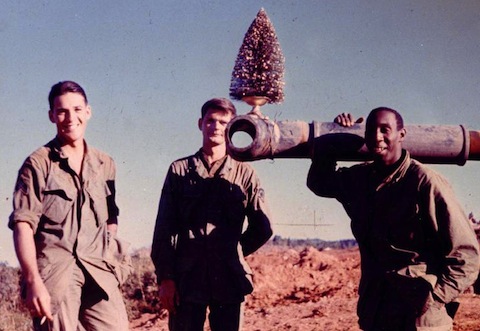
With roughly six months to go ’til my first book is due, you can expect plenty more research extras in the coming weeks. A lot of those posts will be designed to help me think through some of the slippery issues I’m encountering as I shape the central narrative—I’m still struggling to understand the mindsets and motivations of my two principal characters. There are few non-fiction challenges tougher than getting inside the head of someone whose logic doesn’t make sense at first blush.
One tangential story I’ve been contemplating quite a bit is that of Dwight Johnson, a Detroit native who won a Medal of Honor for his bravery at Dakto, Vietnam. Less than three years after receiving the hallowed award, he was killed while trying to rob a grocery store. Johnson’s motive for the crime will forever remain a mystery: He was either trying to get $25 to pay for a minor medical procedure for his wife, or so psychologically broken by his post-war experiences that he couldn’t help but lash out. What is known, however, is that he felt that the Medal of Honor was as much a curse as a blessing—it forever pegged him as someone special, when deep down he couldn’t understand why he had survived Dakto when so many comrades had perished. This heartbreaking New York Times account (PDF) of Johnson’s last months includes excerpts from his Army psychiatric evaluations that reveal his inner turmoil:
The subject remembered coming face to face with a Vietnamese with a gun. He can remember the soldier squeezing the trigger. The gun jammed. The subject has since engaged in some magical thinking about this episode. He also suffers guilt over surviving it, and later winning a high honor for the one time in his life when he lost complete control of himself. He asked: “What would happen if I lost control of myself in Detroit and behaved like I did in Vietnam?” The prospect of such an event apparently was deeply disturbing to him.
Reading the whole sad story of Johnson’s downward spiral, which has some eerily close parallels to the tale I’m cobbling together, I kept on thinking about the burden of heroism. All Johnson wanted was for life to return to “normal,” the way it was before he went to Vietnam, despite the fact that his version of “normal” was quite economically deprived. He never wanted to carry the war back home, but the bestowal of the Medal of Honor made it inescapable—he could scarcely walk five feet in Detroit without someone asking about Dakto. A nation’s earnest effort to hail his exceptional bravery was what caused him to come undone. Call it a textbook case of best intentions gone terribly awry.
(Photo of Dwight Johnson, at right, via Ray Smith)
→ 4 CommentsTags:crime·Detroit·Dwight Johnson·Medal of Honor·military·psychology·Vietnam War
“I’m Smart…and I’m Your Friend”
October 31st, 2011
In honor of Halloween—and in deference to the fact that I gotta split early today for trick-or-treating—I’m once again paying homage to the cinematic evildoer who caused me countless childhood nightmares: undead utopian cult leader Reverend Henry Kane. I dare you to come up with a more terrifying horror-flick villain—the man oozes menace out of every scaly pore. Kind of awesome to know that the actor behind the character, Julian Beck, was a New York theater nerd who was pals with Allen Ginsberg.
Comments Off on “I’m Smart…and I’m Your Friend”Tags:Halloween·Henry Kane·Julian Beck·movies·Poltergeist II
Road Hazards
October 28th, 2011
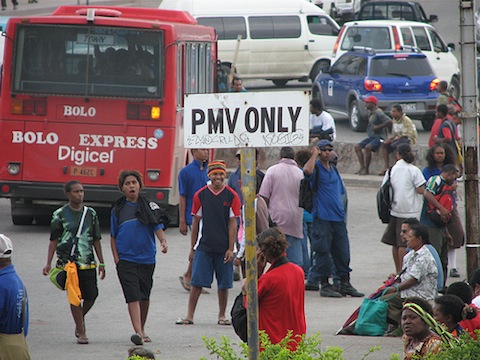
So easy to forget what a high degree of transportation safety we’ve reached here in the United States. I’m not talking purely in terms of vehicle safety—we also are fortunate to have law and order in areas surrounding roads. The lack of that sort of security is what enables folks to blockade entire Indian states, and make assaults on minibuses in Papua New Guinea a seemingly routine occurrence. A 19-year resident of the nation describes one such incident in this richly detailed account of a PMV ride to Madang:
It was dark and all I felt was shattering pellots of window glass all over my face and front, as my fellow passengers barked. It took a few second but I realised this explosion had been a rock and it barely missed my nose in a trajectory right across the sea and out through the opposite window. Such propulsion, it was impressive, and then very scary a I realised I was not hurt, had no blook anywhere, but had almost, by a hair’s breath, been beammed, maybe killed. The bus drove on a bit before stopping and everyone realized the windows were shattered, the owner’s father crying already about how this was a brand new bus (!), why did they do this, and people scrambling out, stompung the dark road, as we rawled ahead to where another PMV had stopped after passing us.
It looks bad, and my drunken co-riders are shouting, searching the seats for their bushknives and the roadside for heavy stones. I get out shaking my head and clothes, pleading for us to go on please and not to start a fight, to go to the police and send them back and all that. But no one listens. The engine is cut and all the riders are cross the culvert to the trees and behind, where I can hear screams rom the village, people yelping and barking and obviously arming themselves for a good fight.
There’s a reason that “suppression of banditry” has often ranked high on the agenda of central government. Unless people can move about their nation free of fear, what chance is there for peace and prosperity?
(Image via Drew Douglas)
Comments Off on Road HazardsTags:banditry·Papua New Guinea·transportation
Old Wounds
October 27th, 2011
How long is a public expected to wait before it can see its national traumas depicted on the silver screen? Here in the U.S.A., that estimated time period seems to get shorter with each passing generation: While over a decade passed between the end of America’s involvement in Vietnam and the debut of Platoon, there was just a five-year gap between the 9/11 attacks and United 93, perhaps the most harrowing film of its sort ever made. (For the record, United 93 ranks second on my all-time “Great Films I Can’t Bear to Watch Again” list, right behind Requiem for a Dream.)
In the French territory of New Caledonia, however, some folks seem to think that the population can’t handle a celluloid depiction of the Ouvea hostage crisis, the defining moment in the archipelago’s yet-to-be-realized independence movement. New Caledonia’s lone theater chain has declared that it will not show the new French movie L’ordre et la morale, because it doesn’t want to “re-open old wounds.” The New Caledonian public is not pleased, and is planning ways to route around the ban:
After an outpouring of criticism, plans are now afoot to show the film in town halls across the territory. According to the local newspaper, the mayors of La Foa and Bourail are among those keen to screen it.
One of the producers says a screening was held in Paris for all New Caledonian politicians present for discussions on the Noumea Accord. He says the only one to refuse the invitation was Pierre Frogier, who is the head of the anti-independence Rassemblement-UMP.
As you might guess based on my chosen profession, I’m firmly in the camp that believes there is no reason that an artistic depiction of tragedy should ever be censored. It’s patronizing to think that people can’t handle storytelling, which is one of the most fundamentally human of all endeavors. Will some viewers of this film have their politics altered as a result? Perhaps. But that will probably happen more often now that they know the film’s content scares those who holds the reins of power. As a friend of mine noted a while back when Lil Wayne tried to kill the documentary about his life, “Doesn’t he know that filing suit will only make me want to see it more?”
Comments Off on Old WoundsTags:censorship·L'ordre et la morale·movies·New Caledonia
Taipan Be Not Proud
October 26th, 2011
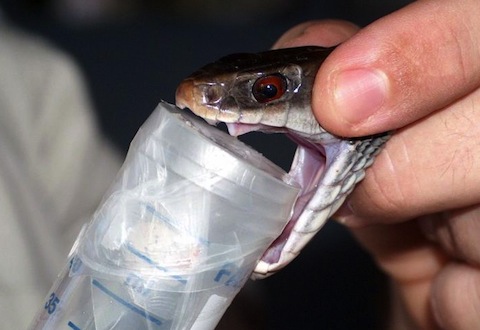
Nearly two years ago, I posted about the exorbitant prices of anti-venom, which seem largely due to the reluctance of pharmaceutical manufacturers to service such a relatively small market. The end result of those companies’ economic sensibility is a dearth of medication in Papua New Guinea, where snake bites are a serious public-health problem:
In Central Province (which surrounds the national capital, Port Moresby), the incidence averages 215.5 victims per 100,000 people, but in some sub-provinces, such as Kairuku (which includes Yule Island and the villages of Bereina and Veifa’a) localized incidence exceeds 1,300 victims per 100,000 – among the highest rates of snake bite in the world. Each year in Central Province an average of 7.9 victims per 100,000 die as a result of snakebites, and this figure may in fact be far higher – many victims die before they can reach Aid Posts and Rural Health Centres, and these deaths rarely register in official statistics.
The good folks over at the Australian Venom Research Unit have been working on this problem for over a decade now. Their goal is to design an anti-venom that can be produced locally in Papua New Guinea, for a price (around $100 per dose) that is not totally prohibitive. They’re finally getting somewhat close to making that happen, having finally received a sizable grant to conduct a clinical trial. If thing pan out like we’d all hope, the new, cut-rate anti-venom will be the first drug of its kind to emerge in fifty years.
The awesome secret to the discount formula? Horse plasma.
More of Microkhan’s surprisingly extensive anti-venom coverage here.
→ 2 CommentsTags:antivenin·Australia·medicine·Papua New Guinea·public health·snakes
Goals and Problems
October 24th, 2011
Last day to take advantage of a sweet childcare situation. Trying to churn out a good thousand words worth of book between now and 5 p.m.—four thousand words less than Sinclair Lewis produced during his eight-hour writing stretches, but we can’t all be geniuses. Back soon with the delectable stuff; in the meantime, I once again urge you most strongly to give Fresh Produce a listen.
Comments Off on Goals and ProblemsTags:Fresh Produce·Gizelle Smith·music·R&B
By Accident of Birth
October 21st, 2011
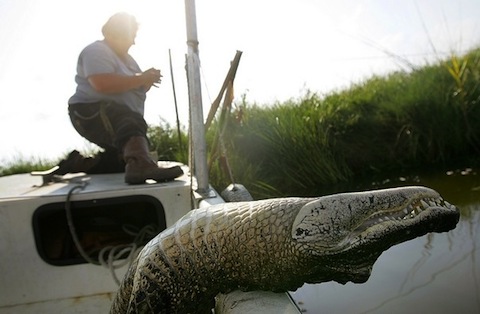
I am sure that hunting alligators on the Bayou is an especially tricky way to make one’s living. But according to this profile of a lady far tougher than I’ll ever be, the vocation is at least somewhat easier if you have the good fortune to belong to a favored family:
Victoria Bouvier, a 41-year-old mother of two from Mathews, has been alligator hunting for the past 10 years and loves it. Growing up, Bouvier was a tomboy: riding horses, hunting ducks, tinkering with cars — all the things her two brothers did. But she only began hunting alligators when she met her husband, Alexie Serigny, a decade ago.
Serigny was grandfathered into the alligator-hunting business, which means he doesn’t have to participate in the yearly lottery for alligator tags. He inherited about 1,000 acres to hunt in an area protected by the Louisiana Department of Wildlife and Fisheries near Cut Off.
The closed-shop nature of Louisiana’s alligator-hunting system isn’t exactly making folks millionaires, though—the profile states that basic gators go for as little as five dollars per foot on the open market.
Comments Off on By Accident of BirthTags:alligators·economics·hunting·Louisiana
Plateau Bargaining
October 20th, 2011
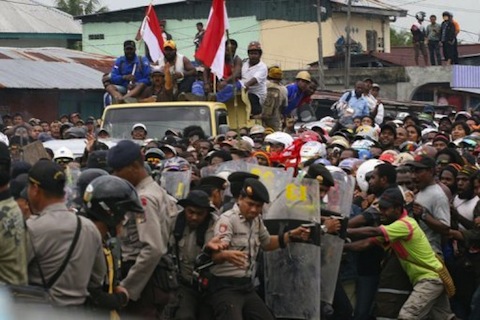
The world economy isn’t only roiled by the machinations of Wall Streeters who are too clever by half; old-fashioned strikes can still upset the delicate equilibrium between prosperity and chaos. An excellent case in point is the ongoing fracas at the Freeport’s Grasberg mine in the restive Indonesian province of Papua. The operation is the third-largest copper mine in the entire world, and accounts for nearly two percent of Indonesia’s total GDP. As explained in this excellent rundown, the workers there have enjoyed little reward for their labor over the years, as most of the proceeds have been siphoned off by corrupt officials in distant Jakarta. That said, the striking workers certainly weren’t shy about opening the negotiations with a wage demand that can charitably be described as leaning toward the astronomical side:
Freeport Indonesia union has said it could lower its pay demand to $7.50 an hour, from a previous demand for at least $12.50 and initial calls of as much as $200 an hour. Current pay is $1.50 to $3.00 an hour.
I would love to know how the union’s representatives calculated that initial wage demand. Perhaps recompense for the billions that have ended up in politicians’ pockets over the years?
(Image via AFP)
Comments Off on Plateau BargainingTags:economics·Indonesia·labor·mining
The Sobotkas of Lagos
October 18th, 2011
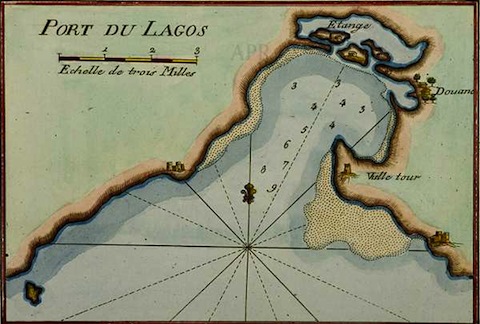
Advocates for limited government appear to have a new icon in Dr. Ngozi Okonjo-Iweala, Nigeria’s finance minister, who appears to subscribe to Ronald Reagan’s fabled view on the public sector. Just check out what she’s doing at Nigeria’s ports, where an alphabet soup of government agencies have been fleecing importers and exporters alike for ages:
The Federal Government through the finance minister and leader of the economic management team, Dr. Ngozi Okonjo-Iweala last week slashed agencies at the ports to half retaining only critical agencies that would have permanent stay at the ports. She also announced the disbandment of the Customs taskforce and directed Customs to begin a 24-hour shift operation…
The agencies issued a two-week ultimatum to vacate the ports included the National Agency for Food Drug Administration and Control (NAFDAC), Federal Environmental Protection Agency (FEPA), Directorate of Naval Intelligence (DNI), National Drug Law Enforcement Agency (NDLEA) and the Plant Quarantine and Animal Quarantine (PQAQ). Others are National Environmental Regulatory and Standards Agency (NESREA), and the Standards Organisation of Nigeria (SON), the Economic and Financial Crimes Commission, (EFCC), Independent Corrupt Practices and other Related Offences Commission (ICPC), among others. Although the finance minister said there were 14 agencies at the port, most stakeholders put the number at over 20…
The reforms, the minister said were targeted at reducing cost of doing business at the seaports, which experts believe is among the highest in the world.
Corruption is nothing new to the world of maritime trade, as anyone familiar with On the Waterfront can attest. But it’s interesting that Nigeria’s problem totally inverts that which plagued the U.S. a couple of generations ago; their racketeers are government employees, rather than mafiosi.
→ 3 CommentsTags:corruption·maritime·Ngozi Okonjo-Iweala·Nigeria
Play with Your Emotions
October 17th, 2011
On a Wired deadline today, so just offering a taste of what’s to come this week—a tangential bit of art peeled off from a newly developed interest in the Torres Strait Islands independence movement. I was hoping to track down an example of the baizam, or shark dance, which features the most awesome headdresses you’ve ever seen. But I had to settle for the above clip of the kab kar, a dance commonly classified as “old fashioned” by those in the know. But the classics never get old, now, do they?
Comments Off on Play with Your EmotionsTags:Australia·dance·Torres Strait Islands
Everything Counts in Large Amounts
October 14th, 2011
Buried in this alarming account of crooked Brooklyn cops is a brief aside about how New York City is settling up with the scandal’s victims. Dozens, if not hundreds of men were falsely imprisoned after having drugs planted on them by police striving to hit their monthly arrest quotas. How much money do those men deserve? The city has a fairly specific dollar amount in mind:
To settle civil actions, the city is paying about $1,000 per hour of wrongful incarceration, said Richard Cardinale, a lawyer in Brooklyn who said he had filed claims for 25 people and received settlements for all of them.
The story offers no explanation as to how that thousand-dollar-an-hour figure was arrived at, which is a shame—the actuarial wizardry that goes into ascribing monetary value to intangible concepts like freedom is truly fascinating. As much as we like to spout platitudes about how life is priceless, the fact of the matter is that when push comes to shove, we’re often forced to put price tags on the most precious gifts of all. And given that our species is pretty adamant in the belief that mathematical formulas can accomplish anything, we’ve actually put a great deal of thought into figuring out the “right” sum to award those who’ve lost an incalculable amount.
I covered this terrain several years back for Legal Affairs, in a piece looking at the formulas that courts use to calculate “hedonic damages”—that is, money to compensate for the loss of happiness. Economists have concocted some pretty ingenious ways to price out such an abstract concept:
AT THE HEART OF SMITH’S FORMULA is a concept called “willingness to pay,” or WTP. This can be broken down into two subsets, the “wage-risk model” and the “consumer expenditure approach.” The former analyzes how much additional salary people demand to assume additional risk. Suppose you’re a security guard and your boss wants to transfer you to a downtown warehouse where the crime rates are higher. In the new neighborhood, your odds of being killed in the line of duty will double from 1 per 2,000 to 1 per 1,000. Aware of this danger, you ask for a pay raise of $3,000 a year. So, according to Smith’s calculations, you’ve just valued your life at $3,000,000—$3,000 multiplied by 1,000. Not that Smith tailors his formula to the particulars of an individual’s life; rather, he examines decisions in numerous professions and comes up with a range of averages.
The consumer expenditure approach looks at how much people are willing to spend on safety products to reduce their risk of death. Let’s say you’ve splashed out $1,000 for a snazzy burglar alarm, which has lessened your risk of being shot by a robber by 0.02 percent; then, you’ve valued your life at $5,000,000.
For some reason, this whole line of inquiry always makes me think of a classic The Simpsons quote, uttered by Bart upon being told that he has found an artifact (an alternate ending to Casablanca) that could be “priceless.” “Priceless like a mother’s love?” he asks. “Or the good kind of priceless?”
→ 2 CommentsTags:corruption·crime·economics·Legal Affairs·police
The Roots of the Infographic
October 13th, 2011
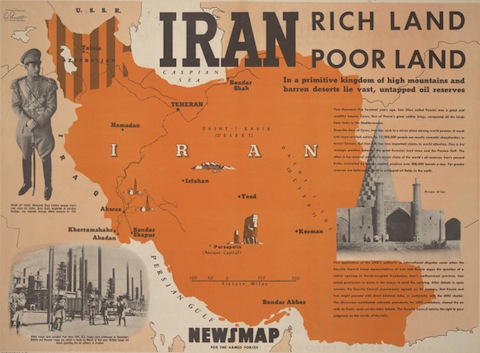
I’m almost ashamed to admit how much time I’ve wasted over the past few days sifting through this nifty archive of World War II “newsmaps,” which were essentially weekly progress updates published by the Army’s Special Service Division. Though tinged with the air of propaganda—it’s not like they ever reported on setbacks, and the enemy was crudely stereotyped—the newsmaps were several degrees more sophisticated and informative than your typical wall poster. Especially as the war drew to a close, the newsmaps’ creators tried to educate Americans about the geopolitical challenges that lay ahead. Granted, their efforts may seem a bit facile in hindsight (see above), but they deserve plaudits for pioneering the integration of meaningful text with beautiful artwork. Their shoulders are what today’s infographic masters stand upon.
Highly recommend that you take a few moments today to check out the whole collection, which is hosted by the University of North Texas. The issue that details the planned assault of Japan that never happened is a personal favorite.
Comments Off on The Roots of the InfographicTags:art·Iran·maps·propaganda·World War II
Have Boot, Will Travel
October 11th, 2011
 Though the Faroe Islands are inhabited by less than 50,000 souls, the Danish dependency boasts its very own professional soccer league—one that includes four separate tiers of prestige, topped by the premier-level Vodafonedeildin. As this excellent photo set demonstrates, even the league’s most elite teams don’t draw enormous crowds—though, granted, the humans in those images are overshadowed by the awesome geological aspects of the Faroese landscapes.
Though the Faroe Islands are inhabited by less than 50,000 souls, the Danish dependency boasts its very own professional soccer league—one that includes four separate tiers of prestige, topped by the premier-level Vodafonedeildin. As this excellent photo set demonstrates, even the league’s most elite teams don’t draw enormous crowds—though, granted, the humans in those images are overshadowed by the awesome geological aspects of the Faroese landscapes.
The relative lack of fan support evidently hasn’t limited the league’s activity in the international talent market, however. Like all the big European soccer entities these days, the Faroese clubs have established a pipeline to Africa, bringing in young Ghanaians and Ivoirians to enhance the quality of play. In fact, the Vodafonedeildin‘s best player this season is a product of that development system:
Ghana’s top scorer abroad currently David Asare hit a brace for FC Suodoroy in the Faroe Island league when they demolished Vikingur away by 6 goals to 1 to consolidate their lead on top of their league.
The 19 years old enterprising youngster netted in the 15th minute and in the 86th minute to take his tally to 20 goals with 4 matches to go and he is now a sure bet to annex the golden boot when their league comes to an end.
“I believe in my capabilities and I know what I can do, I know with God, I will play in one of the top clubs in the world very soon and everyone will see what I possess.”
The deeper story I’d like to see written here is how a 19-year-old Ghanaian experiences life in the distant, provincial Faroe Islands—not as an ordinary immigrant, of which there are surely few, but as a (relatively) major celebrity.
Asare should be careful regarding over-confidence, however. Other great African players who’ve passed through the Faroe Islands may have imagined winding up in England or Spain, but got routed elsewhere. Case in point: Nigeria’s Obi Ikechukwu Charles, a former FC Suduroy player now starring for Yangon United. Not a terrible fate, by any means, but I’m sure Charles never envisioned winding up in Burma when he began his career.
(Image via Eileen Sanda’s highly recommended Flickr gallery)
→ 3 CommentsTags:David Asare·Faroe Islands·Ghana·immigration·Ivory Coast·soccer·sports
No Rest for the Frightened
October 10th, 2011
I’m going to labor under the delusion that y’all have Columbus Day off, even though I don’t. Here’s to hoping that you, unlike the sizable Microkhan team, get to spend the next 24 hours doing something that brings the utmost joy to you hearts.
The Samurais of Sugar
October 7th, 2011

One of the main keys to writing a non-fiction book is resisting the urge to go off on non-essential research tangents. Nothing breaks your rhythm like spending a needless 25 minutes delving into the world of, say, Soviet helicopter design when you really should be focusing on character development.
It is to my great discredit, then, that I spent too much of yesterday reading up on the hazards faced by sugar cane harvesters—there is a very minor detail in my book about this dreadful line of work, which I used as an excuse to procrastinate instead of tackling a tricky section transition. On the plus side, the tangent did introduce me to the excellent “Sugar Cane” series by South African photographer Zwelethu Mthethwa, who explains here how he approached his reluctant subjects in the fields outside Durban:
My first attraction to the sugar cane workers was that they were wearing skirts, and that they looked to me like Samurai worriers. I then found out that, not only were they wearing skirts, but also many other layers of clothing. This was odd to me because Durban is an incredibly hot and humid area. I thought they must be crazy to be wearing so many clothes and still doing manual labour. I discovered, through speaking with them, that the reason was to protect themselves from the burning ground and soot (sugar cane is burnt before harvested); from the very sharp leaves of the cane; and also from the many snakes that like to live in sugar cane fields. The most difficult part of taking these photographs was stopping them from working. These guys are paid according to the weight of sugar cane that they harvest; there is no hourly rate. I felt guilty that I was interrupting and taking their money away from them by asking them to pose for me. So this forced me to move in and out as quickly as possible, interrupting their flow of production as little as possible.
When I read something like that, it makes me feel ashamed to prattle on and on about how writing requires such intense focus.
→ 3 CommentsTags:agriculture·photography·South Africa·Zwelethu Mthethwa
Arm in the Mouth of the Beast
October 6th, 2011
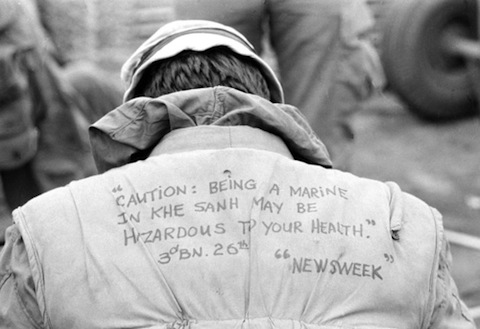
One of those days in which I’ve got to wrestle a chapter to the ground, lest it come to occupy too much real estate in my head. Back tomorrow with something worthwhile.
Comments Off on Arm in the Mouth of the BeastTags:Vietnam War
The Sea Dayaks Bid Adieu
October 5th, 2011

I’ve been slowly pulling together a post about the Iban alphabet, a rather convoluted form of written communication that is nonetheless making a comeback in a small corner of Borneo. In researching the esoteric matter, I came across this excellent illustrated document regarding the funerary rites of the so-called Sea Dayaks, who really know how to say farewell to their dear departed. This aspect of the ceremony struck me as the most touching:
Minta Manok—The Begging of Chicken: After the ngeretok comes the time for the families to beg chicken again from the neighbouring villages whom they intend to invite for the Gawai Antu. The act of begging chicken is a traditional custom during Gawai Antu. It has been in existence since the ancient time of Kedawa, who lost his way and found himself in the other world while following this custom. The host family must carry out this tradition even though they have enough chicken for the occasion. If the host family fail to follow this tradition, they will be criticised by their relatives as an insulting act.
So it’s basically a matter of pretending like you’re suffering far more than you really are. That struck me as odd at first, because my assumption is that a family would wish to show its prosperity during a time of crisis. But then I remembered there was an obvious Western equivalent: the ritual of bringing over heaping plates of food to the family of the deceased after the funeral. It doesn’t matter how well-off that family is—they can’t help but accept many, many casseroles of dubious flavor and quality, for which they are expected to offer the utmost thanks. It’s not begging, exactly, but it’s a subtle exchange of goods in which both sides acknowledge that they still need each other, even if ties of friendship or kinship have been strained by death.
Comments Off on The Sea Dayaks Bid AdieuTags:Borneo·Dayaks·food·funerals
The Other Direction
October 4th, 2011
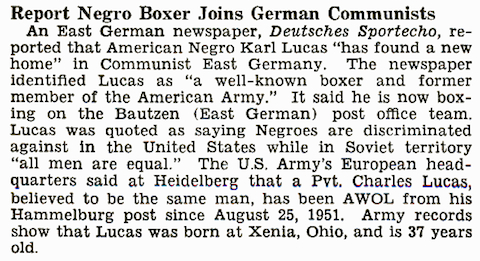
Pesky facts keep getting in the way of my book’s smooth narrative. Take the lovely paragraph I crafted yesterday, in which I argued that no one in the West believed that Cold War refugees could possibly flow toward the Soviet Bloc. An earlier experiment with such migration had ended tragically, after all, and that was before the total demonization of Communism had become a linchpin of American culture and politics.
But after a bit of reflection, I realized there were qualifiers to my blanket assertion. There were, indeed, cases of defections throughout the Cold War, some of which I’ve previously detailed in this space. I’m now committed to unearthing other instances in which Americans crossed the line into the Communist realm, despite the mountain of evidence attesting to the fact that such defections would inevitably result in misery.
One of the first cases I came across in this quest was that of Charles Lucas, aka Karl Lucas, an American soldier who reinvented himself as an East German Everyman in the early 1950s. His story is told in-depth here, an account that includes this interesting tidbit culled from the Stasi’s secret files:
The Stasi agents appeared to be satisfied with Lucas’ behavior. Staff Sergeant Hübner of the Bautzen Stasi office reported “that in his political views, he is impressed by the successes of the GDR and actively supports its development.” In the clubhouse for foreigners and in public, he expressed “positive goals,” the report said. Cadre instructor Schmieger and cadre leader Kasper from the state-owned Bautzen Waggonbau railcar building company, where Lucas worked from April 1955 attested that he had “a positive attitude to our workers’ and farmers’ state as well as the Soviet Union.”
The Stasi also recruited him as an informant, mainly to observe the foreigners in the Clubhouse of International Solidarity and report on any escape plans, which Lucas dutifully did. On Oct. 5, 1955, he signed a handwritten note in English, stating that he was ready to support the Stasi “to safe the Peace of the World and the Safety from the Peoples in the D.D.R. and world. I know the Imperialist powers try to disturb the peaceful construction from the D.D.R.” [sic]. He was to sign his reports with the name Joe Baker.
You will be entirely unsurprised to learn that Lucas met with a bitter (and mysterious) end. An exile’s life is hard enough in the best of circumstances; when it is lived in a nation where the 3-cylinder Wartburg 1000 is considered the height of luxury, you’ve got serious problems.
→ 4 CommentsTags:Charles Lucas·Cold War·Communism·defectors·East Germany
After the Peak
September 30th, 2011
During this past week’s procrastinatory idylls, I had a chance to read two very different accounts of how folks deal with the fallout of fame. The first was an excerpt from an upcoming biography of the late Chicago Bears running back Walter Payton, a man who basically apart after his playing career was over. His daughter neatly summarized the great athlete’s post-football dilemma:
Upon his retirement in the winter of 1988 as the NFL’s alltime leading rusher, Payton found himself burdened by a realization that had struck thousands of ex-athletes before him: I am bored out of my mind. When strangers asked, he talked about how thrilled he was to be free of the burdens of football. “I’m not going to miss the pounding,” he told ABC’s Peter Jennings. “And the getting up at six and working out until dusk.” The words were pure fantasy. He would miss it desperately. “He went from an abnormal existence as an athlete to a normal one,” says Brittney, now 26. “How does anyone do that?”
Payton’s polar opposite just might be Mark Hamill, whose awesome Q&A with The A.V. Club should be read by anyone with even a passing interest in Star Wars (or, for that matter, Corvette Summer). True, there are big differences between what Hamill and Payton experienced—Hamill still gets good work as an actor, for example. But they both had to confront the realization that even though decades worth of life lay ahead of them, they’d always be known for work they accomplished in their twenties. Hamill’s attitude toward this fact couldn’t be more admirable:
But like I say, I try and keep a distance, but also want to make people know. Because people will say, “I know you hate talking about Star Wars…” I say, “I don’t hate talking about Star Wars if you don’t hate talking about Star Wars.” I mean, I’m really in tune with what people want. And I’m not cynical about it at all. And people will say, “Oh, you didn’t get a very good deal.” But I didn’t get into this business for the money in any way. And I didn’t get into it to be remembered in any way. So the fact that it’s had such long-lasting resonance with new generations of audiences, it’s, to me, very special.
I love him for this, just as I once loved him for his skillful gargling on The Muppet Show.
Comments Off on After the PeakTags:fame·football·Mark Hamill·movies·Star Wars·Walter Payton
Only the Little People Pay Taxes
September 29th, 2011

For all but dedicated observers of southern African politics, King Mswati III of Swaziland is known primarily for his polygamous lifestyle and its attendant chaos. But the absolute monarch deserves scorn not for his libertinism, but rather the absolutely atrocious way he has handled Swaziland’s public finances. Mswati’s financial recklessness is the reason his nation is now in desperate need of yet another bailout, even after wasting a $350 million loan from neighboring South Africa. As this enlightening column points out, Swaziland’s problem isn’t just Mswati’s personal profligacy; it’s the way he has structured the country’s business sector for the sole purpose of minimizing the amount he must contribute to the treasury:
Outside of state ownership, Tibiyo Taka Ngwane, a trust that manages investments on behalf of Mswati, is also a significant player. By some accounts it owns one-third of privately held assets in the country. Tibiyo’s website says it is one of the main players in the Swazi economy.
Tibiyo’s financials showed assets of R1.3-billion when it last reported. Its holdings include stakes in Nedbank, the Swazi Spa (Sun International), Royal Swazi Sugar, the Bhunu Mall, Swaziland Development Corporation, Royal Villas, Tibiyo Properties and Illovo Sugar, according to the Times of Swaziland.
Tibiyo reported a profit of R150.2-million last year, according to the Swazi Observer, in which Tibiyo has a 100% stake. The trust has been criticised by the IMF because it does not pay tax. Tibiyo supporters say that while it does not pay tax, the underlying companies in which it invests do.
Mswati’s wealth is opaque, but he has featured on Forbes’s billionaire list, with a net worth of R770-million.
I fail to see how Swaziland’s monarchy does not thus qualify as a criminal enterprise, helping itself to a cut of everything that happens in the country without kicking back a slim nickel for the public’s benefit. Here’s to hoping the ongoing protests make some headway, despite the Mswati’s obvious willingness to use violence to suppress them.
→ 2 CommentsTags:business·corruption·crime·economics·King Mswati III·Swaziland



